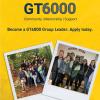news
Discover the Benefits of Becoming a GT6000 Group Leader
Primary tabs
Graduate students who are seeking an opportunity to meet other students, have fun, gain mentorship experience, and make money, search no more!
The Office of Graduate Education is seeking motivated master’s and Ph.D. students to work as compensated group leaders for the GT6000 program from June 2023 through October 2023.
GT6000 is a one-credit hour, extended orientation program for new Georgia Tech graduate students, led by experienced graduate student leaders. The 8-week-long class is helpful for new, on-campus grad students to transition into the academic and social environment here at Tech. GT6000 group leaders co-lead separate course sections, presenting the curriculum in informative, interactive ways, and curating memorable interactive experiences for first-time Tech graduate students.
If you are looking to practice effective communication and presentation skills that will aid you throughout your graduate education experience and in your career field after graduation, read on to learn why becoming a GT6000 group leader is a good idea.
We asked two returning group leaders about their experience leading GT6000 sections. Anamik Jhunjhunwala and Dasha Bukharina left no detail unturned when they shared all the rewarding ways that serving as a GT6000 group leader has been impactful for enrolled students and themselves.
Being a GT6000 group leader helps build community.
After completing a virtual GT6000 course during the height of the pandemic in the fall of 2020, Anamik reflected upon all the cool people in his course whom he wanted the opportunity to interact with more. He realized that as a graduate student, there were fewer opportunities to interact with people outside of his department.
“I thought, ‘why not become a GT6000 group leader this time?’ As a group leader, I would be able to meet a whole new set of students from different departments. They'll be from other departments, and I could help them build that extended community, and then hopefully maintain it through the rest of my Ph.D.
Being a GT6000 group leader creates an opportunity for mutual mentorship.
“In the last GT6000 section I led, there was a student who was roughly late thirties and was an army veteran,” recalled Anamik. “After many years of serving in the military, he came back to do his Ph.D. in economics and that was quite impressive. He had so much life experience, so it was like a mutual mentorship. I was mentoring him. But through his answers and participation, he was mentoring me as well. Going back to the point of what I think is really different, is that you have this diversity of age and this diversity of experience (during a GT6000 section) because all your students are from different backgrounds, and (as a group leader,) you have to mentor them at the same time. But the rewarding part is that you learn from them as well.”
GT6000 group leaders help create quality experiences for incoming graduate students.
“First, I think graduate students don't really get to know the campus like undergraduate students do,” said Anamik. “Graduate students are busy with their master's programs. They are busy with four to five classes every semester, and these are heavy grad-level classes. Ph.D. students have full-time jobs conducting research, and so many of them don’t have time in their schedule to explore the campus and get to know the campus well.”
“There's a lot of engagement with your department, but nobody really tells you how to engage with Georgia Tech. And with GT6000, we have a session that is just based on Georgia Tech traditions to get to know Georgia Tech and get to know Atlanta,” Anamik said.
Being a group leader allows you the opportunity to share your experiences in hopes of leading and positively influencing other students to reach their full potential here at Tech. Dasha shared that she felt like she had an experience worth sharing and she wanted to pass that on to the students that she taught:
“I had challenges during my first year (of grad school). I learned about on-campus mental health resources. I struggled with a class. I think that these primarily might be the biggest concern for new students. So, through talking to them about these things and sharing my experiences, I was seeking to show them that the roadblocks are not the end of the world, that a lot of people go through this, and those were big takeaways for them.”
When asked about some of the more valuable lessons she learned while serving as a group leader, Dasha answered, “time management,” and “how to structure your class and make it interesting were some of the most unexpected (gained skills) for me and required the most time contribution from me."
“As for time management and structure, I think it was mostly learning about preparation and how to present," said Dasha. “To effectively prepare, you can spend time prepping for a class and then you come in and the students aren’t engaging the way you expected them to. So you have to learn to listen to what they want and need and try to adapt a bit. It can be battling to your ego to be receptive, but it really helps you grow.”
“I think that being a group leader is a tremendous opportunity to grow as a leader, a student, and a person as well,” offered Dasha. “In school, you’re constantly working on skills that will contribute to your Ph.D., but the things you learn as a group leader will help you in your program and in the long run. You grow on the personal and the professional side.”
If you are still on the fence or want to gather more information before submitting your application, please visit grad.gatech.edu/gt6000 or reach out to Marc Ebelhar. The deadline to apply is April 2.
Groups
Status
- Workflow Status:Published
- Created By:Brittani Hill
- Created:03/29/2023
- Modified By:Brittani Hill
- Modified:04/12/2023
Categories


